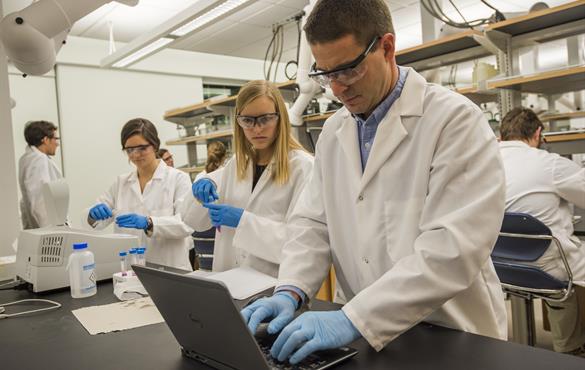McKelvey School of Engineering debuts undergraduate environmental engineering degree
Environmental engineering with chemical engineering flavor — and 'more'

Every year, about 40 students in the McKelvey School of Engineering’s Department of Energy, Environmental & Chemical Engineering (EECE) at Washington University in St. Louis earn a bachelor’s degree in chemical engineering. About a quarter of those students also receive a minor in environmental engineering science.
Beginning in the fall of 2019, however, EECE will welcome its first cohort of students who will graduate with a bachelor’s degree in environmental engineering. In true Washington University form, it won’t be a typical environmental engineering program.
“We’ll have more thermodynamics. More mass and energy balance. More green engineering,” said Daniel Giammar, the Walter E. Browne Professor of Environmental Engineering and chair of the group that developed the new program.
That’s “more” in comparison to traditional environmental engineering programs, which tend to have developed in concert with civil engineering programs, Giammar said. “It will be environmental engineering with the greatest utilization of chemical engineering.”
Or, as Pratim Biswas, the Lucy and Stanley Lopata Professor and chair of EECE, put it: “We are offering environmental engineering with a chemical engineering flavor and more.”
Among the differences between this new program and those tied to civil engineering will be the study in some of the foundational sciences.
“The amount of physics, chemistry and math are somewhat similar,” Biswas said. “But more chemistry, some biology, more math is required in chemical engineering, which will help with environmental engineering.”
In addition, students will study more thermodynamics and mass and energy balance, transport phenomena and the application of these foundational subject areas to not only understand environmental problems, but also help in solving them.
Environmental engineering students’ early coursework will closely mirror that of their chemical engineering peers. Once they advance into more specialized coursework, chemical engineers will have the option to take some of the environmental engineering courses as electives.
“This will provide our students with a very strong background and the ability to make a difference,” Biswas said.
To be clear, Giammar said, both majors will exist under one, unified department, EECE. “We do not view this as the creation of a new department, or even a division of the existing department,” he said. “We remain one, unified department that offers two degrees.”
Classes and lectures will be delivered by the same faculty, about 20 faculty members and three full-time lecturers.
In addition to classroom instruction, the program will have other aspects. “Students will have the opportunity to engage in laboratory and field scale research with the faculty,” Biswas said. “We’ll also have a connection to industry, and we have a strong international connection through programs such as the McDonnell Academy Global Energy and Environmental Partnership (MAGEEP), which will enable students to work on practical problems of global significance.”
Closer to home, students will have the opportunity to branch out within Washington University. In addition to several required classes in Arts & Sciences, elective classes will be offered in areas such as climate change; the global impacts of aerosols; and the interdisciplinary Sustainability Exchange class offered collaboratively by several departments in the university.
The task force didn’t want to go overboard with the required courses, Giammar said. “It’s flexible when it comes to electives.” He expects that there will be a lot of students who choose minors in different areas of engineering, but, he added, students will certainly make some interesting, interdisciplinary choices.
“This is WashU,” Giammar said. “It’s not about being pre-professional. It’s about studying what you’re curious about.”




